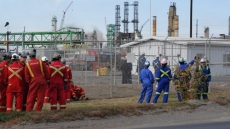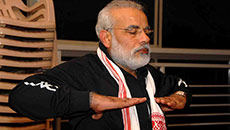WASHINGTON — A United States Senate panel has delivered a scathing indictment of the Central Intelligence Agency's counter-terrorism practices during the Bush era.
It describes how people with suspected terrorist ties were captured, sent to secret detention sites around the world, and subjected to techniques that included torture.
It concludes the program was not only cruel, but also ineffective and incompetently managed. It says details were hidden from top government officials — including then-president George W. Bush.
Here are highlights from a 500-page executive summary of the longer 6,800-page report, which has not been fully released.
— Many people were wrongfully detained. The CIA held at least 119 individuals, 26 of them wrongfully. One detainee was an "intellectually challenged" man nabbed in the hope his relatives might then offer up information. Four detainees were actually moles for national intelligence agencies. A complete list of detainees might never be available, because the CIA never compiled one.
— Torture was ineffective. At least 39 prisoners were subjected to the CIA's so-called enhanced interrogation. Some offered faulty intelligence, some offered nothing at all, and some had already co-operated before they were tortured. The report examined 20 supposed cases where the CIA claimed it gained valuable intelligence from so-called enhanced interrogation, and found the claim exaggerated or untrue in every case.
— It was more brutal than the CIA let on. Detainees were slapped, slammed into walls, and subjected to sleep deprivation for up to 180 hours. Waterboarding caused convulsions, vomiting and near-drowning. Detainees were subjected to "rectal feeding" and forced nudity. Psychological torture included threats to rape a detainee's mother, slit the throat of a detainee's mother, or hurt their children.
— The prison conditions were worse than let on by the CIA. One detainee died in 2002 of suspected hypothermia. Inmates were held in dark rooms, subjected to loud noise and provided buckets to excrete in.
— Even President Bush was kept out of the loop. Bush didn't receive a briefing on the CIA's enhanced-interrogation techniques for four years — until 2006. The CIA also misled the White House, Congress and the public about how useful the program was.
— The White House didn't necessarily push for disclosure. The secretaries of state and defence, Colin Powell and Donald Rumsfeld, were kept out of the loop on key details of the program. An internal CIA email from 2003 said the White House was "extremely concerned Powell would blow his stack if he were briefed on what's going on."
— The Department of Justice produced a legal opinion for the White House on the program, based on bad information from the CIA.
— The CIA fought congressional attempts to learn about the program. For several years, it refused to answer questions, provide details, or gave inaccurate information when elected lawmakers requested information.
— The program sidelined other parts of the U.S. government — including those with expertise in national security. The FBI and foreign-intelligence experts at the State Department were kept in the dark about basic details. In two countries, U.S. ambassadors were only informed of plans to set up a detention site once an agreement had been reached, and in two others, the CIA told local governments not to inform the U.S. ambassador.
— The CIA avoided oversight by its own inspector-general. It did not brief the internal inspector on the program until after a detainee died, and then provided inaccurate information.
— The CIA leaked classified details to the media — much of it inaccurate, designed to exaggerate the success of the program.
— The program was poorly set up and poorly managed. For example, in December 2003, CIA personnel reported that they had made the "unsettling discovery" that the CIA had been "holding a number of detainees about whom" the CIA knew "very little" at multiple detention sites in a certain country.
— Private contractors profited. By 2005, the CIA outsourced interrogations to two psychologists — who had military experience, but no background in counterterrorism, specialized knowledge of al-Qaida, or the Arabic language and culture. The base contract was for $180 million, including a legal-liability fund.
—Some of this lacked approval. At least 17 detainees were subjected to CIA enhanced interrogation techniques without authorization from headquarters.
—The CIA didn't keep track of its own program. It never developed an accurate list of individuals detained. For example, it told the report's authors that it detained fewer than 100 individuals, and less than one-third of them were subjected to "enhanced interrogation." But in searching written documents, the authors found references to at least 119 detainees — with at least 39 of them subjected to those methods.
— The CIA rarely reprimanded or held personnel accountable for inappropriate behaviour. The death and injury of CIA detainees, the detention of individuals who shouldn't have been held, and the use of unauthorized interrogation techniques did not result in appropriate, effective or, in many eases, any corrective actions.
— Internal concerns about the program within the CIA were marginalized and ignored. CIA officers, interrogators, psychologists, and medical staff expressed concerns about the practices but were regularly overridden by management.
— The program began collapsing under its own weight. By 2006, foreign governments resisted hosting these facilities, and information about them regularly appeared in the media. There were at least 113 people detained in 2004, only six more in 2004, four in 2005, one in 2006, one in 2007 and none since April 2008.
— The program damaged U.S. standing in the world. Diplomatic relations suffered. And the U.S. wound up providing millions of of dollars in cash payments to government officials in some countries to host these facilities.





